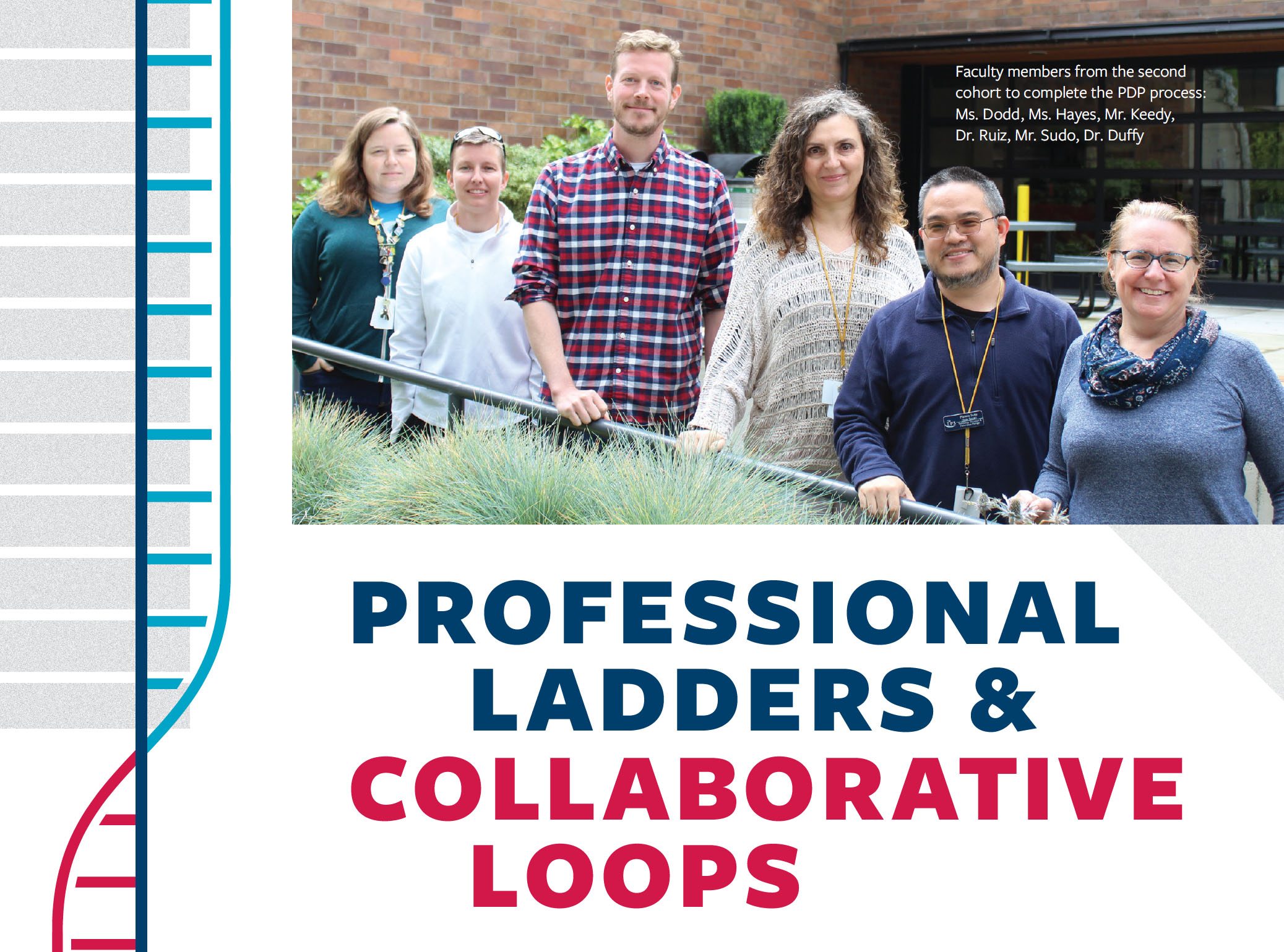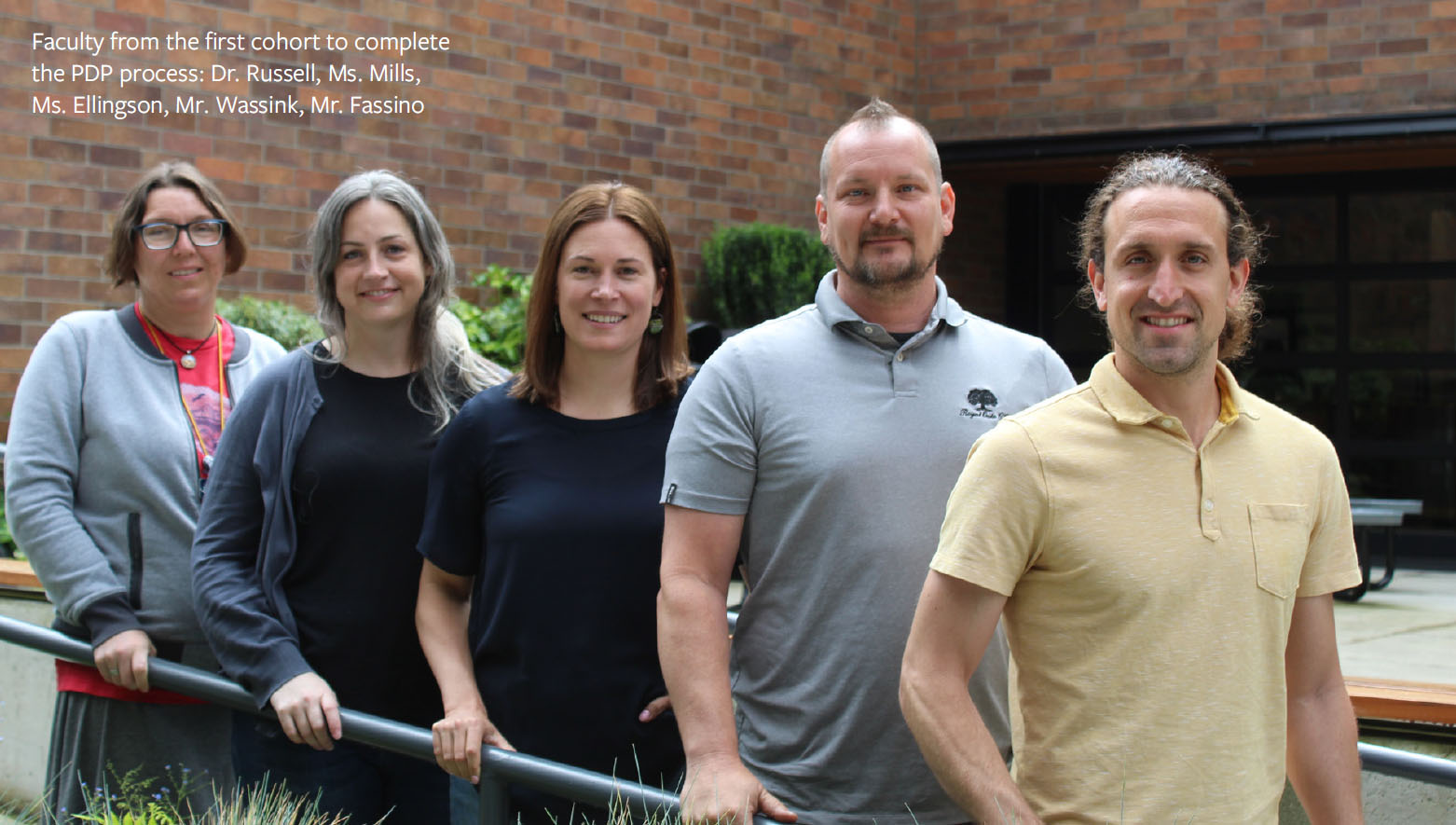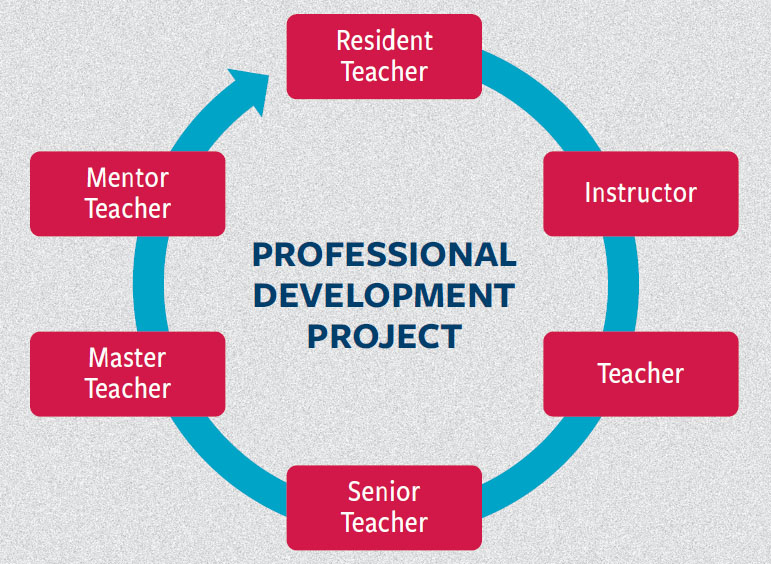
By Matt Delaney, Director of Academic Design & Integration
Different than other industries, from the moment a teacher starts their career to the moment they retire they have the same title, teacher. For thirty years, Dr. Macaluso has been incubating a model that provides a career ladder for independent school teachers.
Eastside Prep faculty members are initially placed into one of five different levels (instructor, teacher, senior teacher, master teacher, mentor teacher) that maps to each faculty member’s:
- Academic degree (Undergraduate, Master’s, PhD)
- Years of experience in the field of education
- Years of experience at Eastside Prep
The Professional Development Project (PDP) is a growth-oriented model that is, definitively, collegial in nature. Each faculty candidate is supported for a full academic year by a Portfolio Feedback Team that is facilitated by a colleague. The facilitator plans meetings with the faculty member, moderates monthly team meetings, provides logistical support for class observations, and keeps the PDP process focused on the past, present, and future development of the faculty candidate.
 During the 2019-2020 school year, EPS launched the Professional Development Project (PDP); a model intentionally designed not as an establishment of status or hierarchy, but as recognition of where each teacher is in their professional trajectory. A cohort of five EPS faculty members constructed a professional portfolio, not for public consumption but as an internal contribution to the professional community. The portfolio that captures: (1) where the teacher is in their development at particular point in their career; (2) reflections on the efficacy of the teacher’s current practice; and (3) what the evolution of the teacher’s craft might look like in the future.
During the 2019-2020 school year, EPS launched the Professional Development Project (PDP); a model intentionally designed not as an establishment of status or hierarchy, but as recognition of where each teacher is in their professional trajectory. A cohort of five EPS faculty members constructed a professional portfolio, not for public consumption but as an internal contribution to the professional community. The portfolio that captures: (1) where the teacher is in their development at particular point in their career; (2) reflections on the efficacy of the teacher’s current practice; and (3) what the evolution of the teacher’s craft might look like in the future.
As the school moved to EPSRemote in March 2020, professional exchanges in smaller Microsoft Teams meetings and gatherings kept the Eastside Prep professional ecosystem connected and growing. All five faculty candidates successfully completed and shared their portfolios in June 2020. When it became clear that EPS would remain remote for at least the beginning of the 2020-2021 school year, the PDP was put on pause. With our return to campus in the 2021-2022 school year, six more EPS faculty members surrounded by feedback teams of five to six colleagues built upon the platform established by the inaugural cohort.
THE PDP IS A GROWTH-ORIENTED MODEL THAT IS, DEFINITIVELY, COLLEGIAL IN NATURE. EACH FACULTY CANDIDATE IS SUPPORTED FOR A FULL ACADEMIC YEAR BY A PORTFOLIO FEEDBACK TEAM THAT IS FACILITATED BY A COLLEAGUE.
To date, eleven faculty members have successfully completed the PDP process; with ten faculty members invited by the Head of School to participate during the 2022-23 school year. Each spring, faculty members complete a survey to indicate their interest in participating in the PDP in the following academic year. Faculty cohorts and PDP feedback teams are constructed with a lens focused on diversity and inclusion that considers: different academic disciplines, teaching levels/career points, genders, and degrees of readiness. Teachers may accept the invitation from the Head of School or defer for a future year.
Thirty percent of EPS full-time faculty members have now completed the PDP, with a plan for the remaining seventy percent to complete the PDP over the course of the next five years.
As we look to EPS’s next twenty years, we continue to reflect on and evolve EPS programs like the PDP. Reflections and feedback from the first PDP cohorts are highlighted on these pages. This feedback loop contributes directly to the improvement of the PDP model and to the health of EPS’s professional community of scholars.
Ginger Ellingson
2019-2020 Cohort
“The PDP provided the opportunity to dive deep into my teaching practices, strengthened relationships with colleagues, and ultimately, amplified my commitment to EPS and my students. In addition, I was able to better see both similarities and differences between the Arts and other academic disciplines.”
Krissy Russell
2019-2020 Cohort
“The PDP provided a structure to analyze my teaching in a formal process. I’m looking forward to going back to my portfolio this summer to review areas for growth and incorporate them into my plan for the next school year.”
Melissa Hayes
2021-2022 Cohort
“The PDP provided opportunities to have colleagues observe my classes and provide feedback that I incorporated into my lessons. I also shared the PDP process with my students. I really enjoyed the experience and I’m looking forward to joining a Feedback Team for a future cohort.”
Josefa Ruiz Mercader
2021-2022 Cohort
“The PDP gave me the opportunity to meet with colleagues outside of the Spanish discipline, to go deeper into conversations about teaching, and to use a structured process to ask for and receive feedback. Through many conversations with colleagues, we built stronger relationships, and in turn, they were able to provide me more specific and constructive feedback.”
Masato (Maz) Sudo
2021-2022 Cohort
“One of the greatest impacts of the PDP was the direct feedback that I received during the PDP meetings, classroom visits, and casual lunchtime chats. I established stronger connections to EPS through my team, and gained insight into the Spanish, English, and Science disciplines, as my colleagues learned more about the Technology discipline. These connections allowed me to feel more open to talking to and asking for advice from members of my team.”
Eastside Prep Resident Teacher Program (RTP)
The PDP currently has five levels: Instructor, Teacher, Senior Teacher, Master Teacher, and Mentor Teacher. As part of EPS’s 20th anniversary celebration, a sixth level will be added to the PDP, Resident Teacher.
 Professional soccer teams have programs where they develop homegrown players. The function of the EPS Resident Teacher Program (RTP) is to grow independent school educators with solid foundations in the following domains:
Professional soccer teams have programs where they develop homegrown players. The function of the EPS Resident Teacher Program (RTP) is to grow independent school educators with solid foundations in the following domains:
- Professionalism and Executive Functioning
- Pedagogical Practice
- Curricular Design
- Relational Cultivation
The addition of the Resident Teacher role rounds out a professional feedback loop where resident teachers new to the profession, will be mentored and trained by EPS faculty at the master and mentor teacher levels.
Throughout the process, resident teachers participate in a meeting cadence that includes collaboration with their mentor/master teacher, division head, and join other resident teachers in their cohort in a graduate-level seminar. The seminar is structured around each of the four PDP domains listed above.
The resident teacher experience follows a cadence often used in the field of education: I do, we do, you do. In the summer and fall trimester, resident teachers shadow their mentor teacher, not only observing teaching in the classroom, but also collaborating on curricular design, focusing on student well-being, and participating in the school culture to understand the complexity of how a modern-day independent school is organized and functions.
Resident teachers spend the winter trimester co-planning and co-teaching with their mentor or master teachers. In the spring trimester the mentor or master teacher is afforded the opportunity to engage in a professional sabbatical, while the resident teacher conducts two of their class sections.
